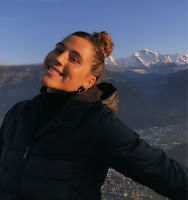We will be blogging individual articles from The League Line, our quarterly newsletter
Link to Fall 2020 edition: http://bredl.org/theleagueline/Fall2020.pdf
~By Ann Rogers
On October 6, Roanoke County forwarded to Virginia
Department of Environmental Quality (DEQ) a request from BREDL and 49 residents
of Roanoke County and neighboring communities to require Mountain Valley
Pipeline (MVP, LLC) to revise the Project Specific Standards and
Specifications for Virginia (Standards), the Erosion and Sediment
Control Plans (ESC Plans), and the Stormwater Management Plans (SWM Plans) for
the Mountain Valley Pipeline, prior to any further pipeline construction in
Virginia.
The letter from BREDL and 49 co-signers states: “In an effort to prevent construction of the MVP from damaging the headwater streams of the South Fork of the Roanoke River in Bent Mountain, and in an effort to prevent sedimentation from damaging the Roanoke River and many other waterways downstream of those Bent Mountain headwaters, the requested revision should include:
· Correction of MVP, LLC’s flawed calculations, as described in this letter, that have resulted in under-reporting of peak stormwater discharge and employment of inadequate sediment barriers and techniques
· Recognition of the presence of a high concentration of ground-water in the Roanoke County portion of the MVP project area, as detailed in Roanoke County’s LiDAR mapping, and consideration of how this groundwater is anticipated to be transferred to the surface during pipeline construction, where it will contribute significantly to stormwater runoff
· Recognition of the risk of pipeline explosion in Roanoke County due to the high volume of groundwater in steep and rocky terrain, which may lead to subsurface flows and earth movement in the pipeline corridor
· Plans for utilization of the highest-capacity, highest quality sediment barriers at every MVP construction site, as based on correct calculation of peak stormwater runoff
· Consideration of the hundreds of variance requests for the MVP approved by FERC that are not addressed in the 2017 or 2020 Standards, ESC Plans, or SWM Plans, including variance request H-21 which alters the method of crossing the Roanoke River just upstream of the Spring Hollow Reservoir Intake
· A public comment period and public hearings in each MVP-affected community in response to the corrections to stormwater calculations for the MVP as requested in this letter.”
The letter identifies a flawed assumption that is pervasive throughout MVP, LLC’s calculation of stormwater runoff from MVP construction areas, which results in employment of ineffective stormwater management protocols and equipment. MVP’s calculations use the condition of the pipeline corridor after the vegetation has been successfully restored as the basis for calculation of the stormwater runoff immediately following pipeline construction. In other words, soil condition that would occur after a period of successful re-vegetation is used in MVP, LLC’s stormwater runoff calculations as a substitute for actual soil condition immediately following pipeline construction.
As
described in BREDL’s letter, this substitution is strongly associated with
failure of MVP, LLC’s erosion and sediment control activities throughout the
period of pipeline construction from May 21 through November 15, 2018 that
resulted in detrimental impacts to soils, streams, and wetlands as documented
in the DEQ and State Water Control Board Complaint against MVP issued December
7, 2018. MVP was fined $2,150,000 for these water quality violations in a
Consent Decree signed on October 23, 2019.

















